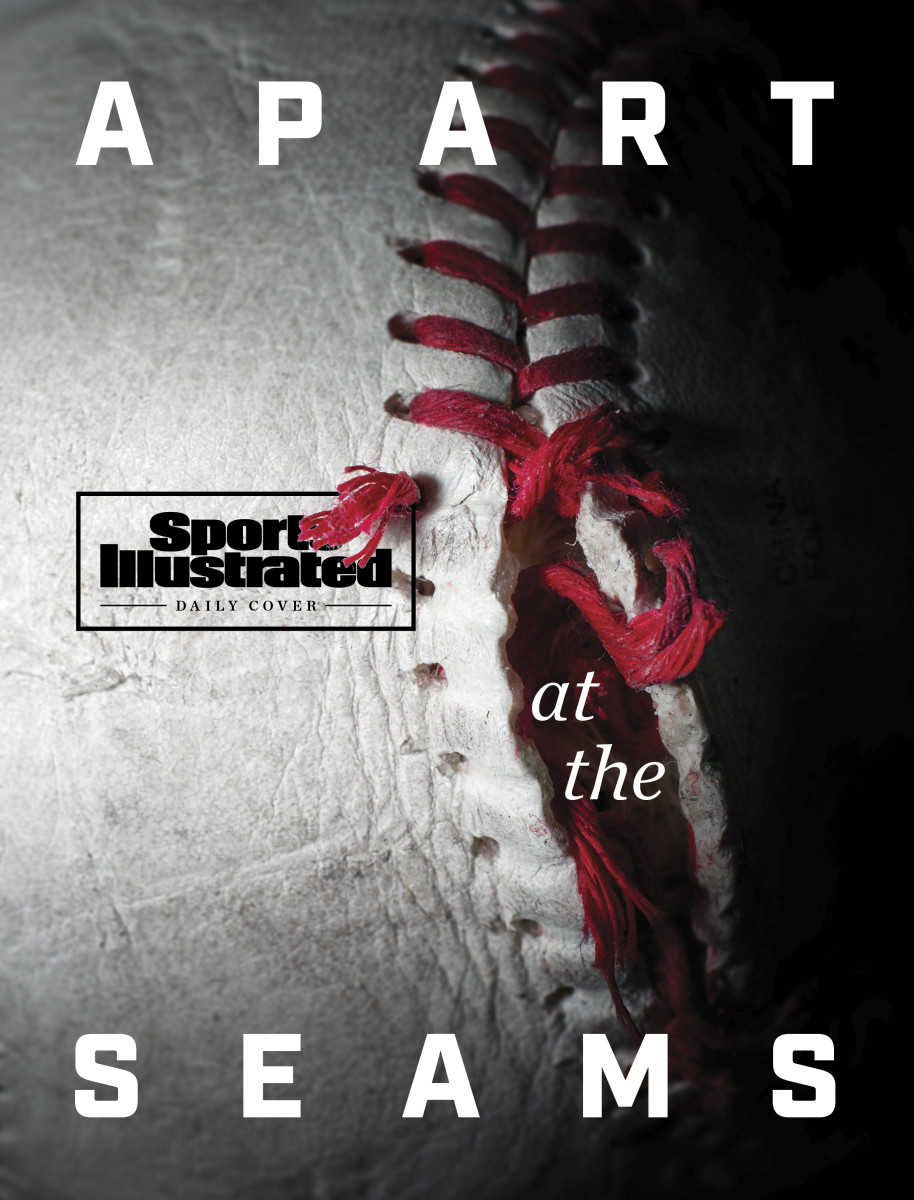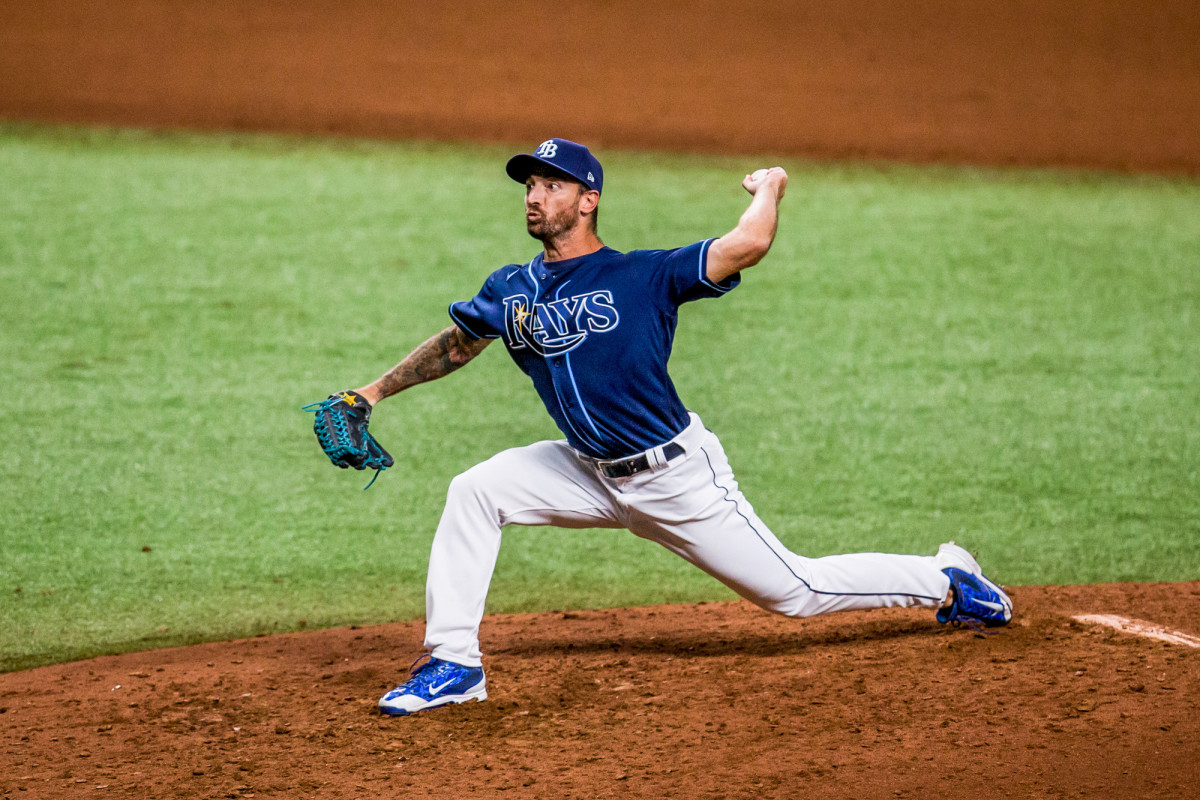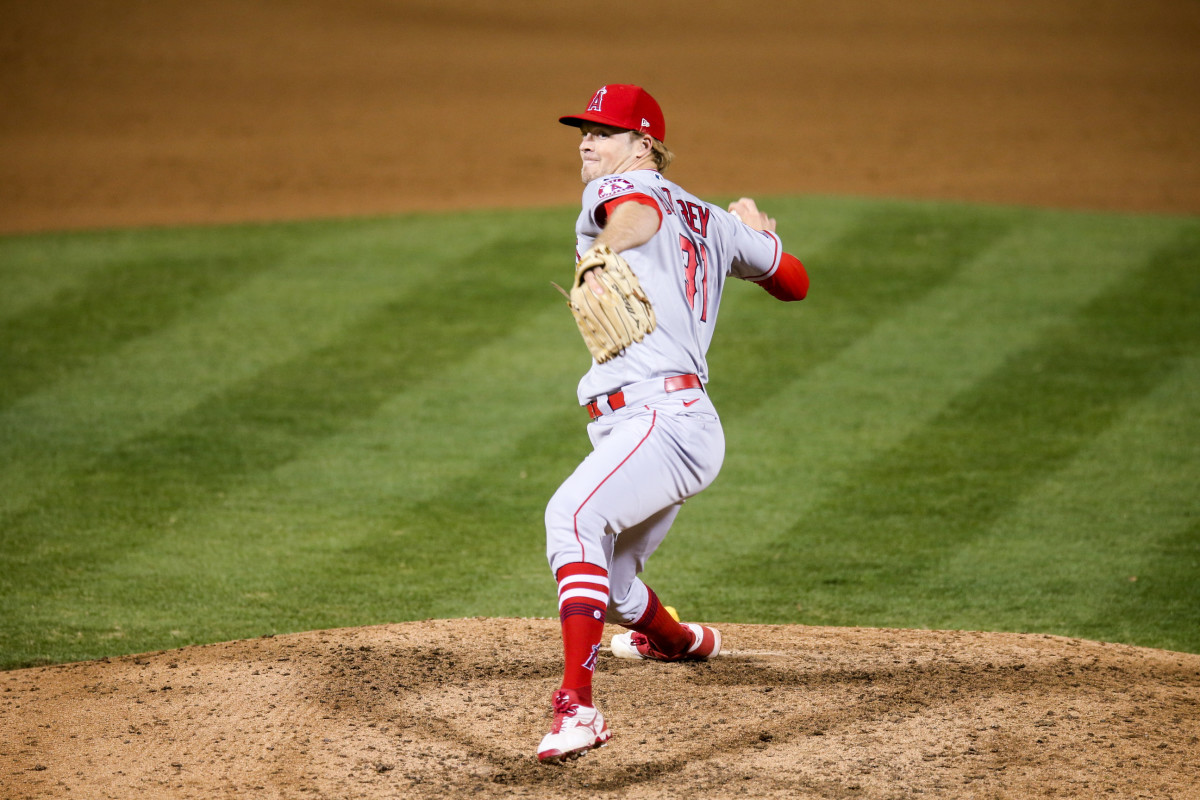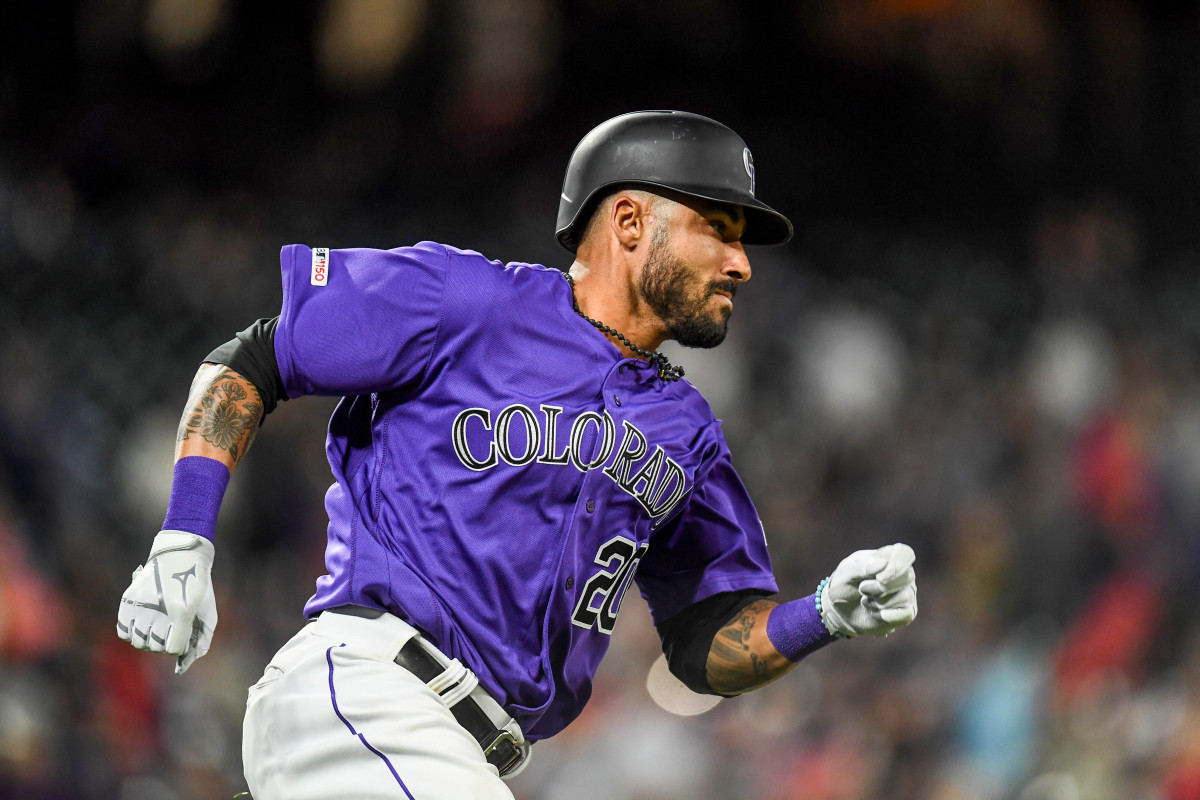Baseball's Mental Health Reckoning

Tampa Bay Rays relief pitcher Ryan Sherriff knew something was not right. He felt it as soon as he stepped on the mound to protect a 2–0 lead in the seventh inning against the Marlins in Miami in the second game of this season. Manager Kevin Cash had gone to him in a high-leverage moment, an indication of how far Sherriff had traveled to earn this kind of trust.
Last season Sherriff, 30, did not allow a run during his 10 regular-season appearances, becoming the 12th pitcher in baseball history to pitch a scoreless season of 10 games or more. He added two more scoreless outings in the World Series. These seemed idyllic times for a 28th-round draft pick who pitched nine years in the minors, overhauled the way he threw a baseball mid-career, and was once released while rehabbing from Tommy John surgery. Unbeknownst to most everyone else, Sherriff hurt deeply inside.
“As soon as I toed the rubber, I felt nothing,” Sherriff says. “No emotions. No adrenaline. Nothing. I thought, Wow, what am I doing here if I don’t feel a damn thing? We’re winning 2–0. It’s the seventh inning. That’s when I knew: ‘I need to leave.’ ”

Sherriff gave up a run-scoring double and a two-run single before getting the third out. After the game he telephoned his agent, Lonnie Murray, while still at the ballpark.
“I’m done,” Sherriff told her. “I have to retire. I can’t do this anymore.”
Says Sherriff, “I didn’t pitch well that night, but that had nothing to do with my leaving.”
Murray was not surprised. She had been concerned about Sherriff for a year.
“I noticed this was building,” she says. “He was saying, ‘I don’t know that I can do this. This is getting hard, Lonnie.’ He just finally reached the point where he said, ‘I can’t do it anymore.’ ”
Sherriff walked away from baseball. He walked away from the game of his childhood dreams, formed over trips to Dodger Stadium with his father, who was such a fervent Dodgers fan he told his son he wouldn’t speak to him if he ever signed with the Giants. He walked away from the game he had been playing as a pro for 11 years for low wages; only this year would he be making his top salary, $574,800, at the age of 30.
The next day Angels pitcher Ty Buttrey, 28, quit baseball. Four days later, reliever Chris Devenski, 30, left the Diamondbacks for personal reasons. Seven days after that, Phillies outfielder Adam Haseley, 25, left baseball. Last September shortstop Andrelton Simmons, 31, left the Angels to deal with depression and suicidal thoughts before joining the Twins for the 2021 season. Rockies outfielder Ian Desmond, 35, opted out of last season and this season, forgoing $13.56 million in salary, to be with his family while concerned about racial injustice. Rays pitcher Ryan Thompson, 28, had an emotional breakdown days after pitching in the World Series last year, burdened by how the job of playing baseball had skewed his priorities.
A mental health crisis is percolating in baseball. To be clear, not all players placed on the restricted list for “personal reasons” experience mental health issues. One agent, though, with a client who stepped away from the game says he asked the players association how many players were on the restricted list with mental-health-related issues and was told, “More than a dozen.” Unlike players who have physical injuries and are placed on the injured list, those with mental health issues sometimes do not receive pay or service time if they are placed on the restricted list, as have Sherriff, Buttrey, Devenski and Haseley. (It is possible for players on the restricted list to continue receiving benefits related to mental health by working outside agreements with their club. In the past, teams have also simply elected to put players on the injured list, where their benefits automatically continue.)
“What the hell is going on in baseball?” the agent asks. “Why are we having these problems? And is baseball facilitating them? These are questions we need to ask.”
On one hand, baseball players are no different from those in the rest of society, which for more than a year has dealt with the twin enormous stressors of a pandemic and a national reckoning over racial injustice. A study last July by the Kaiser Family Foundation, a San Francisco nonprofit, found that more than half of American adults (53%) reported their mental health suffered from worry and stress related to the coronavirus. As recently as last month, even as vaccines rolled out, almost half the adults (47%) still reported a negative impact on their mental health related to COVID-19.
The March study also found that about one out of every four U.S. adults (24%) knew a close friend or family member who died of complications from COVID-19. More than half of those affected by the death of a loved one reported a negative impact on their mental health (53%).
On top of those stressors, however, baseball presents high-profile, high-intensity challenges. The pressure to perform (in a public, measurable way) at a time when clubs churn rosters more than ever. The isolation and curbs on personal freedom created by COVID-19 protocols. The lack of minor league baseball for the past 18 months. The elimination of more than 700 professional roster spots because of the downsizing of the minor leagues. The ease and proliferation afforded by social media to direct hatred toward ballplayers because of their public profile, including known salaries.
“The stresses are greater now more than ever,” Murray says. “I have multiple clients suffering. Most of the guys I know are struggling in some way.
“I think we have to consider that athletes have the same stressors that each of us experiences on a daily basis. On top of that is the stressor of having to compete at an elite level to keep their job, to deal with family feedback, to deal with some so-called fans that lash out at them and use money as the reason why they should take it.
“People are more rabid than ever. Everybody is angry. Everyone teases that Twitter is a place for trolls and we can laugh about it, but we all feel it. It’s just another added stressor. At the same time, the ballplayer is reminded that it’s another income stream that’s related to their success and popularity.
“The truth is they deal with more. They have to handle all of the stressors at home, and then on top of that be a good teammate and compete at an elite level. And the worst part is they are living in conditions that don’t allow them the normal outlets to step away from the game.”
Buttrey explained in an Instagram post that he walked away because he was “tired of pretending” that he loved baseball. “I am beyond excited to finally be a normal, hardworking dude,” he wrote. Haseley, a 2017 first-round pick out of the University of Virginia, is nicknamed “Rev” because of his religious convictions and calm demeanor. He walked away for “personal reasons” and has not elaborated. The Phillies don’t know whether he is coming back. Thompson told the Tampa Bay Times he “had a breakdown” in which he cried on an airplane because he realized the demands of baseball took him away from his core personal and religious principles.
Last Friday Sherriff returned to the Rays’ alternate site in Port Charlotte, Fla. His comeback has begun. Sherriff says he is telling Sports Illustrated his story about dealing with mental health issues so that he can help others.
“Hopefully I can be an advocate,” he says. “I would want other players and people to reach out to me. I’m glad that I was able to pave the way for other athletes to do this, by stepping up and talking about it, and to let them know there is more to life than baseball games. Your happiness is what matters more.
“Something that I can tell people is, ‘Reach out.’ I should have reached out sooner when I was feeling this way right after the World Series. Reach out to your team. They will be behind you.
“This is a serious thing. With everything that is going on, COVID has exacerbated mental health issues. It’s definitely a trigger. I’m glad I can help other athletes. I want to share my story. I also think clubs need to understand we are humans as well. They need to understand we as athletes have to consume a lot of stress. If they can be supportive of that, that would mean so much.”

Ryan Sherriff grew up in the Los Angeles County neighborhood of Culver City, two blocks from the Mar Vista Gardens housing projects. He told the Tampa Bay Times last year he watched the Bloods and Crips fight turf wars there. He watched people executed with shots to the back of the head in a park. High school teammates joined gangs.
His maternal grandparents survived the Holocaust; his grandmother was freed from Auschwitz and his grandfather from Bergen-Belsen. His father, Larry, left home when Ryan was seven years old. His mother, Renee, occasionally took him to a nearby motel to visit his father. It was only a few years ago that he learned Larry had issues with cocaine, alcohol and gambling.
Seven months after St. Louis selected Ryan in the 28th round out of Glendale Community College, Larry died in January 2012 at age 57 from multiple myeloma, a blood cancer.
“I had no idea what professional baseball was like,” Ryan says. “I was probably the worst pitcher in Rookie Ball. They sent me [down] to Short A. I figured I’d never make it as a 28th-round pick throwing 88 to 91, so I decided to drop my arm angle down in 2016. I had nothing to lose at that point. I had $750 to my name and thought I was the richest man in the world.”
The arm angle change gave him deception. He reached the majors in 2017. The next year he blew out his elbow while striking out Joe Mauer of the Twins. Two months after his Tommy John surgery, still unable to throw, Sherriff suddenly was released by the Cardinals.
“I gave everything in my power to try to get to the big leagues for that organization,” he says. “I have no words to describe it. I tried to do everything I could do. Just to get released like that, it shattered me.”
In October the Rays called Murray. They wanted to see Sherriff’s medical records. They offered him a contract. Sherriff could hardly believe it. Tampa Bay wanted him even though he was unable to throw.
“Honestly, I’ve only been in two organizations, but the Rays have to be the best,” he says. “They have the best farm system, the best support, the best analytics.”
The Rays showed Sherriff data about the extraordinary horizontal movement on his slider and sinker. They encouraged him to throw those pitches more and to “use the plate as much as I can.”
One month before Sherriff reported to the Rays’ 2020 spring training, an uncle died from COVID-19. He did not tell the team about it, but the loss deeply affected him.
“I felt so bad for her,” he says about his aunt. “It was just so tragic. She so loved that man.”
Says Murray, “He was excited about his first spring training with the Rays. Then COVID hits. He was healed from Tommy John surgery, which was two years in a form of quarantine in Port Charlotte. Now he goes back into another form of quarantine, and fears that baseball is over for him. He builds a gym in his garage at home. He was meditating. I was staying as close to him as I could.”

When baseball emerged from the lockdown, Sherriff returned to the alternate site. He joined the Rays in late August. Whether in Port Charlotte or with the Rays he adhered to baseball’s strict protocols. He felt confined.
“One of my favorite things to do was to eat breakfast at a café, and just soak in the relaxing time,” he says. “Instead, you are stuck in your hotel room ordering room service. People think room service doesn’t sound so bad, and it’s not, but it’s like total isolation. You end up feeling trapped.
“I think a lot of it for me became an issue at the alternate site last year, dealing with what to me was feeling trapped. I’m an extreme extrovert. I love to be social. We were not able to go out at all and risk getting COVID—and risk getting your teammates sick. That puts a strain on people, especially for someone like me who is an extrovert.”
Says Murray, “I had a minor league guy who knew he wasn’t supposed to leave camp, but he did. He got caught coming back. He said, ‘I just needed to get out, to go on a drive.’ This is one of the most straightlaced, All-America type guys in his organization. Everybody was stunned that this was the guy who broke protocol. But he just felt he had to get out and go on a drive.”
The Rays pitched Sherriff 10 times. He gave up no runs. He pitched twice in the World Series. Again, he allowed no runs.
“The first time I pitched in the World Series it was Stand up to Cancer night,” he says, referring to Game 3. “That’s what my dad died from. It was such an emotional feeling. I couldn’t feel my legs. Here I am, this kid from Los Angeles pitching against the Dodgers in the World Series, my dad’s favorite team, and they had just held the Stand up to Cancer ceremony.”
Sometime during the postseason, he deleted the Twitter app on his phone.
“I couldn’t even look at these trolls any longer and how people just badmouth other people,” he says. “It just baffles me how people talk about other people. People forget that athletes are human as well. We are vulnerable. We should be vulnerable. It’s okay.”
His conversations with Murray became more concerning to her during the offseason.
“I felt the pressures that came from not allowing a run and my own perfectionism,” he says. “And I was going back to that isolationism. The bubble in the World Series was pretty strict. And then in the offseason in Los Angeles, everything was shut down and I was not wanting to risk getting sick going into spring training. The pressures grew, especially knowing I would be expected to perform like that again.
“The pressures and stresses after the World Series also grew because I’m like this local celebrity in Culver City. I went to school there. Everybody was like, ‘God, you pitched in the World Series. You did so great.’ I’m thinking, I’ve got to do this again for everybody. Now COVID was one trigger and not being able to live up to expectations was another.”
Says Murray, “It was nonstop. Now the stress was in every conversation. I hate to say they were tense, but I would say they were sad and emotional because he was not able to process his emotions. For me I knew what was going on, but even when I said it to him, he wouldn’t relate to it. That’s how far detached he was that he was unable to sit and reflect.
“All the things going through his mind … his childhood, how long he fought to get to the big leagues, how he felt he might let everybody down, from his teammates to his mother to his team, if he gave up a run. He was projecting outward what he thought everybody was thinking.
“He lost the love. He lost his ability to focus on the fact that he loved the game. He was not enjoying himself. Every day was a struggle. That was the one word he kept using: struggle.”
The strict protocols remained in place this year in spring training. Sherriff was pitching well, but he was unhappy.
“I was going about my business as if everything was okay,” he says, “but I was feeling kind of down the entire time. I’d call my friends and admit I was burned out, tired. One day Cash tells me I’m breaking camp with the big league team. I should have been excited, but once we got into that hotel in Miami, I felt the pressure again. ‘Oh, my God. I have to perform. I have to be perfect.’ ”
The first time Cash asked him to pitch in a game this season, Sherriff could not take it any longer.

Sherriff has talked with Thompson, his teammate, about their mental health issues. “He told me he was going through the exact same thing,” Sherriff says. “I’m glad I can relate to so many people.”
He read Buttrey’s goodbye to baseball on Instagram. “I related to that post so much,” he says. “I understand where he is coming from. Guys like myself throw everything into one basket. I don’t know what the outside world is like. It’s like an identity crisis. We have no clear identity outside of baseball.
“We live in the unknown, day after day. There is no form of stability unless you are one of the superstars. Sometimes I wonder what it’s like to have a real job and a stable life. For the past decade I have been living an unstable, nomadic life.”
Back in Triple A in the Cardinals’ organization, Sherriff was told by a pitching coach, “Guys like you who are drafted in the 28th round have to prove you can pitch. Everybody else has to prove they can’t pitch.”
“Best thing I ever heard,” Sherriff says.
The need to prove never stops, not even after a scoreless season and pitching in the World Series. Players with options like Sherriff can be demoted at any time. When he decided to quit, Sherriff explained what was going on to Cash, pitching coach Kyle Snyder, general manager Eric Neander and mental skills coach Justin Su’a.
“I probably didn’t articulate it early enough,” he says. “I’m so grateful to the Rays for how they supported me. Now I get more fulfillment out of helping people than playing baseball. The reason why I felt that was I couldn’t help myself. Now I can and hopefully I can talk to anyone who is going through this. Hopefully this gets the spark back and this enjoyment of the game that I lost.”
Murray believes Major League Baseball and its clubs need to improve the support they provide for mental health issues. “If the clubs are being honest,” she says, “they know that mental skills coaches do not take the place of licensed therapists. There has to be a differentiation between mental skills—meaning, on the field—and how they are actually doing as people.”
Another agent noted that players with mental health issues receive less support than those with physical issues. A player who can’t play because of an injury accrues pay and service time; the player who can’t play because of a mental health issue does not. “If an executive at a company suffers from depression, they don’t send him away with no pay,” the agent said.
Murray advocates for mental health training for managers and coaches, the “frontline workers” who deal with players every day. “Instead of focusing on rule changes,” she says, “it would be nice and thoughtful of the players you say you support to train coaches on identifiers, so they can then refer them to the trained therapist.”
Also the agent for catcher Bruce Maxwell, who kneeled for the national anthem in 2017 in protest of racial injustice, Murray remains concerned about societal stressors on all players.
“For someone like Bruce, there are triggers,” she says. “These deaths that are continuing you have to think are triggers, especially for Black players but also for white and brown players who feel the effects of this. I’ve had a couple of players who aren’t Black want to talk about it.
“All these stressors are going on across the board, from high school to college to the minor leagues to the big leagues. You know what’s shameful? Here we are in the middle of a pandemic and the idea is to cut minor league teams. We took the dreams of 700 players, that opportunity, and said, ‘Now you figure it out.’ There was no consideration given to their mental health and the mental burden that is still there as far as the pressures.”

After two weeks away, last Friday Sherriff reported back to Port Charlotte, where he has spent the better part of the past four years, almost all of it under the restrictions of his elbow injury or the COVID-19 protocols. He has found professional help through the Rays and has welcomed the club’s support. Sherriff remains on the restricted list and is only working out informally, but Murray says she is “100% confident” he will be back pitching in the big leagues this year.
“As long as Ryan stays healthy physically, there is nothing else I can anticipate that would keep him from coming back,” she says. “He is better now than he was presurgery.”
Asked about his comeback plans, Sherriff says, “I’m doing good. First day back was good. I’m just going to try it out and see where it goes from there.”
He is more excited about the opportunity to help others than he is about baseball. He has a message for fellow ballplayers experiencing mental health issues.
“I would want them to reach out to me,” he says.
He also has a message for baseball fans.
“I just want everybody to know I have a huge support system behind me,” he says. “I have great friends who I talk to all the time on Facetime.
“I also want people to know this: Understand that athletes are people, too. And please, treat people with decency. That’s a good place to start.”
Clarification: A previous version of this story referred to Angels minor leaguer Taylor Ward not playing games at the club's alternate sites because of, per manager Joe Maddon, "different things going on in the world today.” Ward was not playing in games due to COVID-19 protocols.
More From Tom Verducci:
• The Most Important MLB Season in Nearly Three Decades
• Francisco Lindor Wants to Save Baseball One Smile at a Time
• Will MLB's Best Hitters Recover From Their Awful 2020 Seasons?
• MLB's Next Great Rivalry Is Here
